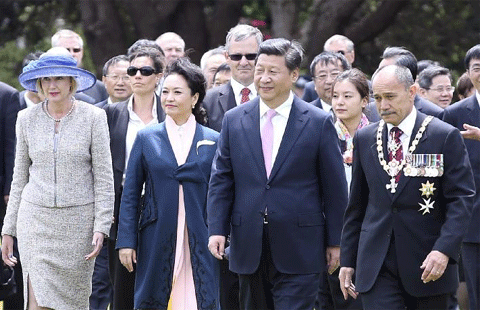Li reviews health of economy
Updated: 2014-11-21 10:42
By Zhao Yinan in Yiwu, Zhejiang and Chen Jia in Beijing(China Daily)
|
||||||||
A reading below 50 indicates factory activity is contracting.
Zhu Haibin, chief economist for China at JP Morgan, said activity in November may have been adversely affected by the Asia-Pacific Economic Cooperation meeting in Beijing. Many factories around the capital were closed to reduce air pollution during the talks.
Qu Hongbin, chief economist for China and the joint head of Asian economic research at HSBC, said he is concerned that the lower figure reflects increasing deflationary pressures that may reduce employment in the future.
"Weak price pressures and low capacity utilization point to insufficient demand in the economy," he said.
Qu believes the pace of economic growth may continue to slow in the coming months because of uncertainties in the housing market and on the exports front.
"More monetary and fiscal easing measures should be deployed," he said.
Global commodity prices, especially those of oil and rice, are continuing to fall, and as a result, inflationary pressures in China and many other Asian countries are easing.
Cutting interest rates may be the preferred option for central banks in the region to stimulate growth and ease the high debt burden, according to experts.
The State Council announced a set of measures to tackle the problem of high financing costs on Wednesday, but made no reference to fine-tuning monetary policy.
Zhu said, "If the new framework fails to bring down funding costs, the government is likely to reassess the monetary policy framework, and rate cuts could be on the table in the first quarter of 2015."

 Jack Ma shares tips at Internet summit
Jack Ma shares tips at Internet summit
 President Xi attends welcoming ceremony in Wellington, New Zealand
President Xi attends welcoming ceremony in Wellington, New Zealand
 Car-rental firm revs up Wall Street
Car-rental firm revs up Wall Street
 Cui hails Obama's China trip
Cui hails Obama's China trip
 Peek into the life of Puju performer
Peek into the life of Puju performer
 Top 10 most powerful businesswomen in China
Top 10 most powerful businesswomen in China
 Top 10 most powerful businesswomen in China
Top 10 most powerful businesswomen in China
 Love conquers leprosy in Luduo village
Love conquers leprosy in Luduo village
Most Viewed
Editor's Picks

|

|

|

|

|

|
Today's Top News
Deng Long: New York supermarket king
China wants its voice heard in cyberspace
New Zealand welcomes Xi
Alipay brings the frenzy of Black Friday to China
Emission goals in China on target for 2020
Li positive on govt-Qualcomm resolution
E-commerce will change global trade: Jack Ma
Jack Ma shares tips at Internet summit
US Weekly

|

|








